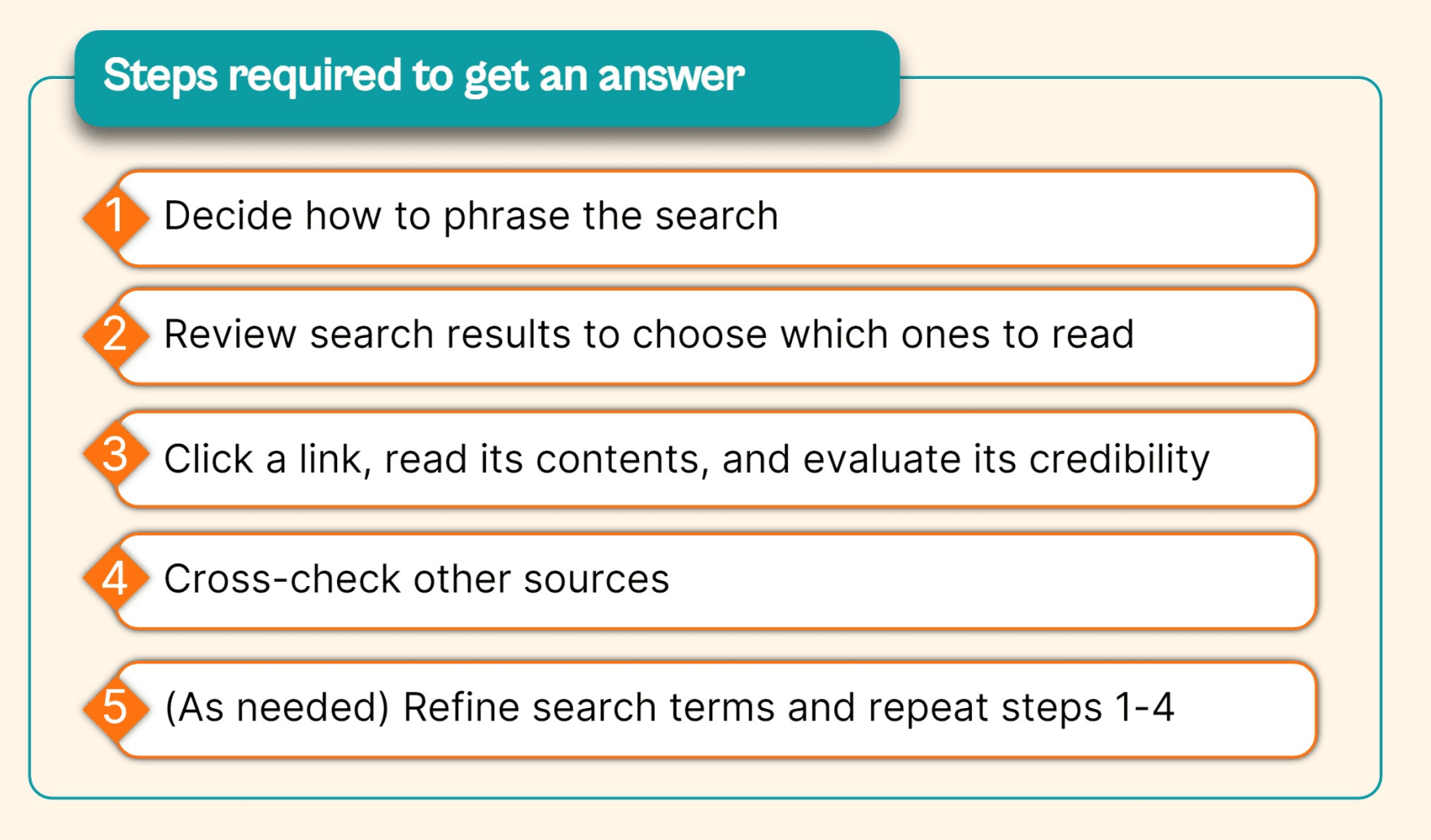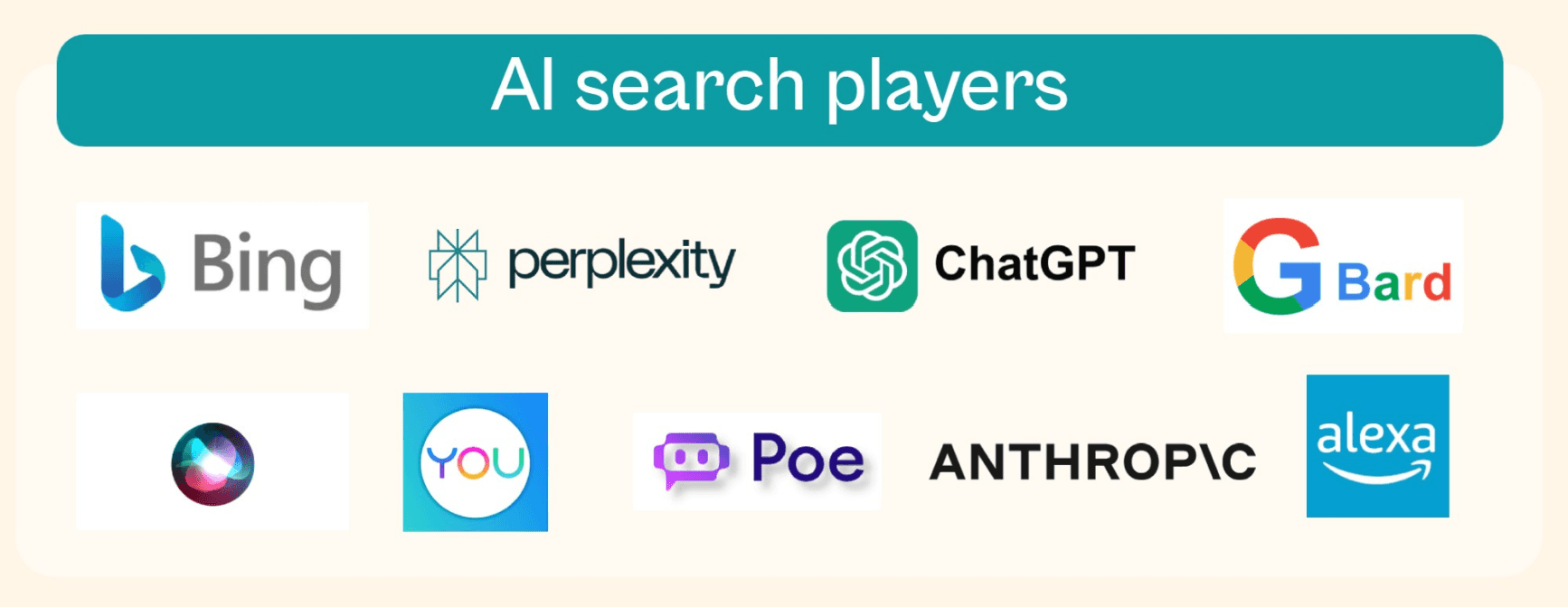AI News
Google is being disrupted by AI. How can marketers adapt?
Google search is antique. AI is disrupting the 25-year-old behemoth. What does this mean for marketers?
Feb 2, 2022


Google creates work for users. Users need to dig through links, iterate, then synthesize on their own.

On the other hand, AI search does it for you. An example is Microsoft Copilot (aka Bing), which rephrases your search, reads through multiple sources, then presents you an answer.

Compared to tools like these, Google SGE will be inferior. Google prioritizes advertisers and Google properties (e.g., Maps, Shopping). Google's AI search product, SGE, is second-fiddle. Disruptors like Perplexity only serve users. They prioritize answers, not ads.

Competitors are racing to dethrone Google. Microsoft CEO Satya Nadella has pledged to destroy Google's profit margin in search. Bing includes GPT4 for free. This costs $20/month through ChatGPT. Perplexity raised $100M to replace search with answers. Alexa, Siri, and startups will continue to hack away at Google's dominance of search.

These disruptors want to own the search killer: personal concierges. Search will be subsumed by personalized AI-agents: Souf Chef, Travel Agent, Shopping Assistants.

How should marketers adapt to this shift?
Create original content: Answer engines need sources. You'll be rewarded for bringing material that is not in the training data and not available elsewhere online.
Target niches: AI tools are great at 'general' answers but tend to hallucinate for specific or technical topics. For those, they will refer to sources.
Watch for Payola: Pay-for-placement in answers will emerge as a major ad channel. Early signs: ChatGPT's deal with Business Insider and Google's ads within SGE.
Sources:
20 interviews with marketers and AI builders; Crunchbase, Financial Times, Insight Venture Partners, Sequioa Capital; Lit review
Authors:
Monte Desai (Founder @ Pixii), Risa Komatsu (Growth Lead @ Pixii)
Google creates work for users. Users need to dig through links, iterate, then synthesize on their own.

On the other hand, AI search does it for you. An example is Microsoft Copilot (aka Bing), which rephrases your search, reads through multiple sources, then presents you an answer.

Compared to tools like these, Google SGE will be inferior. Google prioritizes advertisers and Google properties (e.g., Maps, Shopping). Google's AI search product, SGE, is second-fiddle. Disruptors like Perplexity only serve users. They prioritize answers, not ads.

Competitors are racing to dethrone Google. Microsoft CEO Satya Nadella has pledged to destroy Google's profit margin in search. Bing includes GPT4 for free. This costs $20/month through ChatGPT. Perplexity raised $100M to replace search with answers. Alexa, Siri, and startups will continue to hack away at Google's dominance of search.

These disruptors want to own the search killer: personal concierges. Search will be subsumed by personalized AI-agents: Souf Chef, Travel Agent, Shopping Assistants.

How should marketers adapt to this shift?
Create original content: Answer engines need sources. You'll be rewarded for bringing material that is not in the training data and not available elsewhere online.
Target niches: AI tools are great at 'general' answers but tend to hallucinate for specific or technical topics. For those, they will refer to sources.
Watch for Payola: Pay-for-placement in answers will emerge as a major ad channel. Early signs: ChatGPT's deal with Business Insider and Google's ads within SGE.
Sources:
20 interviews with marketers and AI builders; Crunchbase, Financial Times, Insight Venture Partners, Sequioa Capital; Lit review
Authors:
Monte Desai (Founder @ Pixii), Risa Komatsu (Growth Lead @ Pixii)
Google creates work for users. Users need to dig through links, iterate, then synthesize on their own.

On the other hand, AI search does it for you. An example is Microsoft Copilot (aka Bing), which rephrases your search, reads through multiple sources, then presents you an answer.

Compared to tools like these, Google SGE will be inferior. Google prioritizes advertisers and Google properties (e.g., Maps, Shopping). Google's AI search product, SGE, is second-fiddle. Disruptors like Perplexity only serve users. They prioritize answers, not ads.

Competitors are racing to dethrone Google. Microsoft CEO Satya Nadella has pledged to destroy Google's profit margin in search. Bing includes GPT4 for free. This costs $20/month through ChatGPT. Perplexity raised $100M to replace search with answers. Alexa, Siri, and startups will continue to hack away at Google's dominance of search.

These disruptors want to own the search killer: personal concierges. Search will be subsumed by personalized AI-agents: Souf Chef, Travel Agent, Shopping Assistants.

How should marketers adapt to this shift?
Create original content: Answer engines need sources. You'll be rewarded for bringing material that is not in the training data and not available elsewhere online.
Target niches: AI tools are great at 'general' answers but tend to hallucinate for specific or technical topics. For those, they will refer to sources.
Watch for Payola: Pay-for-placement in answers will emerge as a major ad channel. Early signs: ChatGPT's deal with Business Insider and Google's ads within SGE.
Sources:
20 interviews with marketers and AI builders; Crunchbase, Financial Times, Insight Venture Partners, Sequioa Capital; Lit review
Authors:
Monte Desai (Founder @ Pixii), Risa Komatsu (Growth Lead @ Pixii)